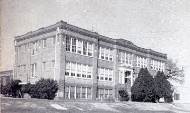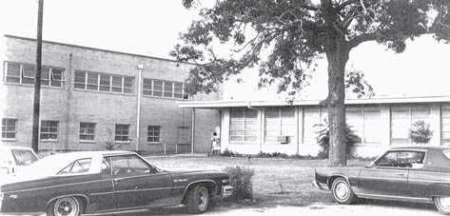




Milam County Historical Commission
Milam County, Texas
All credit for these articles go to
Susie Sansom-Piper and
the Rockdale Reporter
Milam County, Texas
All credit for these articles go to
Susie Sansom-Piper and
the Rockdale Reporter

index to Black History month articles
Written by Susie Sansom-Piper and
published in the Rockdale Reporter
Written by Susie Sansom-Piper and
published in the Rockdale Reporter
On The Other Side of the Tracks - Series 7 - Part 4
by Susie Sansom-Piper
Rockdale Reporter - 2014-02-27
60s: Big Changes in Nation, Town
As time ventured into the 60s, many changes in the community began to surface on the south side of the tracks.
The city finally laid sewage lines, giving access to indoor plumbing, and natural gas also became available.
Families could now enjoy warmth in winter, and decent cooking facilities, yet, there were still no paved roads on the “other” side of the tracks. The head of the household no longer had to solely depend upon the success of farm crops, and traveling to South and West Texas to gather crops, for provisions during the winter months.
The Alcoa plant was not only available to local workers, but many drove to the plant from neighboring towns.
SHOOTOUT - This idyllic setting was soon disturbed with a shootout between the local police and two brothers from the south-side of the tracks. The argument was simple and strange, for it involved a dispute with a service station owner, over the purchase of gasoline.
The end results were the wounding of one of the officers, the death of one brother, and a three year prison term for the other brother.
After serving his sentence, he returned to Rockdale, and became a very worthy citizen. He said: “There were so many people in our town who stood up for me and made life easier, for they felt that I was not guilty, but only protecting myself and my family.”
Once again, the uniqueness of this city was shown. This was the only known major crime in the sixties.
The desire and pressure for “civil rights” was the great issue at this time.
Throughout most of the southern states, there were riots, beatings, sit-ins, etc. However, very little of these brutal actions were in the Texas area.
President Kennedy had initiated the call for civil rights before his assassination.
President Johnson expressed the desire for the passage of this bill, noting that it was a cause that Kennedy had fought diligently for. He met with Congress days after the assassination, and said: “No memorial oration or eulogy could move or more eloquently honor President Kennedys’ memory than the earliest possible passage of the Civil Rights Bill.”
On July 2, 1964, President Lyndon B. Johnson signed the Civil Rights Act. This outlawed all major forms of discrimination, including public schools, work places, and against racial and ethnic minorities and women.”
INTEGRATION - The next three years brought many changes to this community.
Numerous statements, opinions, and questions came from both sides of the tracks, concerning how Rockdale would deal with the upcoming integration changes: “When will we integrate the schools? I don’t want my child to cross the tracks in front of those joints. I hope my child will have only white teachers in the future. I feel so sorry for those little black children, because they won’t have decent clothes to wear. How will they get to the schools?...and on and on.
Milano and Thorndale had quietly integrated the year before, and Davilla students were transferred to Bartlett, which was only eight miles away.
In the midst of this, the remaining Class of 1965 quietly prepared for the final graduation ceremonies at Aycock.
The high school departments of Rockdale and Aycock were fully integrated during the 1965-66 school term.
Two Aycock teachers were transferred to the high school. Students of this community in grades 1-8 remained at Aycock.
The school year of 1966- 67 was designated as “Freedom of Choice” year, meaning that any student at Aycock, from grades 1 – 8, could attend Rockdale Elementary or Middle School on the north side of the track.
One teacher was transferred to Middle School.
TRANSITION - During the 1966—67 school term, 51 students and four teachers remained at Aycock to write the final chapter of a great school. The final day was terminated with a barbecue under the oak trees on the campus.
In 1967-68, obedience to the Civil Rights Act was completed. Finality meant transferring of students to the elementary school, and assignment of the four remaining teachers to elementary, middle school, and special education.
These happenings changed the general face of community life on the other side of the track, but the real essence lies in the fact that the “uniqueness of getting along” still remains.
THE 60s - Here are some of the prominent Rockdale African-Americans of the 1960s:
Gladys McKee, Ethel Green, Delores Phillips, Emma Jean Douglas, Ernest Smith, Sharon J. Williams, Bobbie Nell Richards *, Johnnie Sanders, Aycock graduates to teachers. (The names of Richards and Sanders were incorrectly listed in the previous installment on the 1940s-50s)
Lora Lee Turner, Alyce Sanders, Estelle Fair, Registered Nurses.
Dennis Brooks, minister, founder of religious school.
Zelma Marie Mitchell, professional model.
Willie Lee Majors, Gloria Nell Crawford, real estate and accountant.
Henry James Bradford, armed services career, rancher.
Clara F. Clark, secretary, co-founder of religious school.
Hope Cook, telecommunications.
Daisy Majors, secretary, special receptionist.
Patricia Gayle Jones, medical researcher.
John Williams, engineer.
Lon L. Williams, bank vice-president, Rockdale code inspector.
Clifford Anthony Norwood, armed services career.
Bettie Jean Miller, secretary.
Doris Robertson, community worker and great vocalist.
(Story to be continued)
Aycock High School operated through the mid-1960s, then integrated with RHS.

Rockdale Reporter file photo